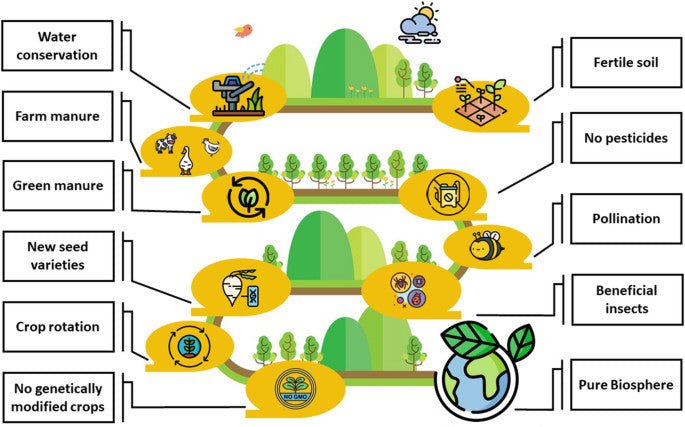
Benefits of Organic Farming

Organic Farming is a force into a holistic future with a myriad of different benefits. The following is a cutout of a report from the Rodale Institute. The link to the full report with all the sources can be found at the end of the post.
Environmental Benefits
Organic farming, with its foundation in ecologically balanced agricultural principles, presents a myriad of environmental benefits. By avoiding synthetic fertilizers and pesticides, organic farms significantly reduce the likelihood of groundwater contamination. For instance, a comprehensive study in Europe found that areas with intensive organic farming had 40% less nitrate in groundwater compared to conventional farming regions [32]. Organically managed soils show a higher water-holding capacity and infiltration rate due to their higher organic matter content [33,34]. Furthermore, by prioritizing soil health through practices like crop rotation and green manuring, organic farming not only augments soil fertility but also improves biodiversity. A meta-analysis revealed that organic farms, on average, support more plant, insect, and animal species than conventional farms [35]. Such practices also play a pivotal role in attenuating soil erosion, with some estimates suggesting that soil erosion potential can be reduced by over 61% with organic practices [36,37]. Land management with organic manure can increase soil organic matter [38]. Agriculture is a major contributor to climate change, emitting around 22% of global anthropogenic greenhouse gas (GHG). Organic management has shown reductions in total GHG emissions per unit area [3].
Economic Benefits
While facing the initial financial challenges remains in transitioning to organic farming, the long-term economic prospects are promising. Organic products consistently command premium prices often between 20 and 30% higher than their conventional counterparts. By eliminating the recurring costs associated with synthetic fertilizers and pesticides, organic farms can also achieve substantial savings eventually. Furthermore, the “organic” label offers a competitive edge in the market. For example, the global organic food market Sustainability 2024, 16, 1530 5 of 25 size was valued at approximately USD 208.2 billion in 2022 and is expected to grow at a compound annual growth rate (CAGR) of 11.7% from 2023 to 2030 [39]. Organic systems also have higher socio-ecological resilience than conventional systems owing to its diverse mixed farming approach, which can minimize risk by reducing the economic dependence on a single crop [3].
Health Benefits
Organic foods, which are produced devoid of synthetic pesticides and genetically modified organisms, cater to the escalating consumer inclination for natural and uncontaminated foods. Research has indicated that organic crops, on average, have higher concentrations of antioxidants, lower levels of cadmium (Cd), and a reduced frequency of pesticide residues compared to conventionally grown crops [40]. For instance, organic tomatoes were found to contain, on average, more vitamin C than conventional tomatoes [41]. By reducing the application of synthetic chemicals, organic farming also minimizes the potential health risks posed by pesticide residues. This approach has potential to decrease the incidence of certain chronic diseases and conditions [42].
content source:
rodale institute
